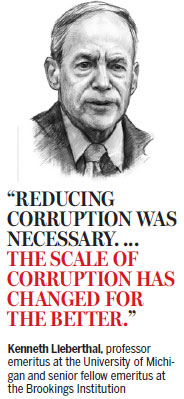China-US relations are key to global, regional stability
Editor's Note: The Communist Party of China has just concluded its 19th National Congress in Beijing. China Daily asked four prominent experts for their views on developments in China and the country's global leadership.
What has been China's biggest achievement over the past five years? What's the most notable change you've observed?
The anti-corruption campaign. I recall being in China in the runup to the 18th CPC National Congress (in 2012), and the complaints I heard from people in various sectors about corruption at that time were wide ranging and bitter. Corruption seemed to have reached a scale that was potentially socially destabilizing and deleterious to policy implementation. Reducing corruption was necessary, and sustaining a vigorous anti-corruption effort over the past five years has been a significant accomplishment. The scale of corruption has changed for the better.

There is no single most notable change - there have been major developments in many aspects of China's economy, social life, civil society, politics and foreign policy. President Xi Jinping's leadership style differs significantly from that of his predecessor, and those differences are reflected in many aspects of life in China.
What's the biggest challenge China faces, and how do you feel the country can go about overcoming it?
Development, especially human capital development among rural young people, poses a set of major challenges as China tries to transition from a middle-income country to a high-income country. Most young people are still raised in the countryside, and many lack the skills and education that will be needed to work in an increasingly innovative and technically demanding economy. This is in part a legacy of the long-standing hukou (housing registration) system, and it's a huge problem.
Environmental challenges are also acute. Most reporting in the media focuses attention on air pollution, which is a visible and critical issue. But China's biggest environmental problem is water, the shortage of usable water resources. Part of this stems from a natural legacy problem - most of China's water is south of the Yangtze River, but most of its population is north of the river. Climate change will likely exacerbate this problem.
What is your impression of President Xi Jinping?
Before the 18th National Congress, I recall many specialists speculating as to whether Xi would be a strong leader, ready to take significant initiatives and use strong measures to address the top items on his agenda. He has answered that question decisively.
How do you view China's role in today's world?
China plays a major role in today's world. While it is seldom possible to fully solve major global or regional problems, China's capabilities are now sufficiently large that the United States and China together have a massive impact on everything from global economics, trade and finance, to the world's capacity to deal with epidemics, climate change, terrorism, and so on.
Where the US and China either actively cooperate or act along parallel lines, transnational issues typically become manageable; where the US and China act at cross-purposes, these problems become intractable and dangerous. In short, China-US relations will be a major factor in regional and global stability and prosperity. At this point, both countries are worried about the long-term intentions of the other - and it will require astute leadership on both sides to find ways to provide strategic reassurance and to enhance the prospects for constructive cooperation.
Do you believe that some of China's experiences or practices could be used to solve pressing global problems? If so, what are they?
China has certainly had both positive and negative experiences that can provide insights for understanding and dealing with pressing global problems such as development strategies, poverty alleviation, environmental degradation and resource depletion (such as loss of forest cover). But China has many unique characteristics that mean its experiences and practices can rarely simply be copied elsewhere. China's own experiences in the reform era have highlighted the importance of adapting policies and lessons to local conditions and circumstances. Adopting a similar spirit in applying China's experiences and practices to address global problems is the most effective way to think about the question you raised.


















